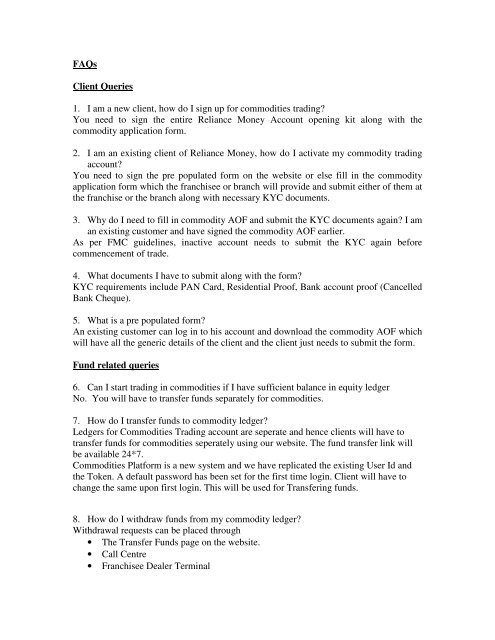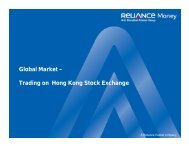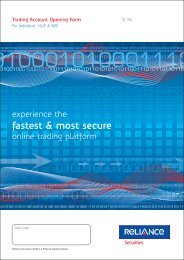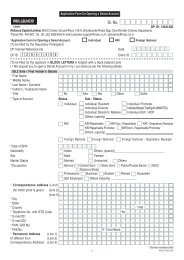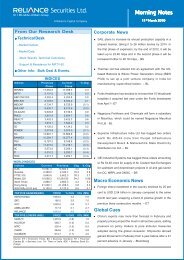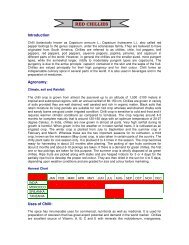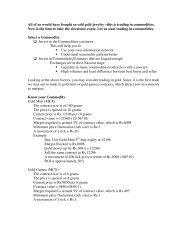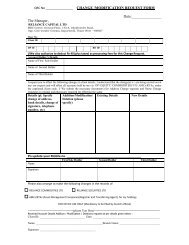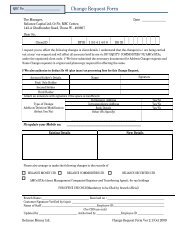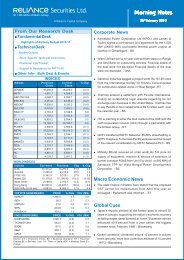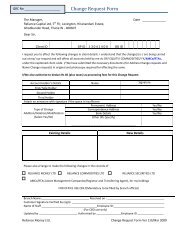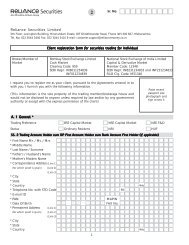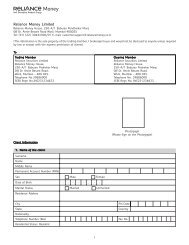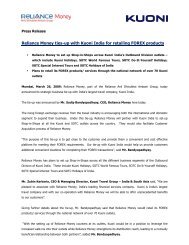You need to sign the entire Reliance Money A
You need to sign the entire Reliance Money A
You need to sign the entire Reliance Money A
Create successful ePaper yourself
Turn your PDF publications into a flip-book with our unique Google optimized e-Paper software.
FAQs<br />
Client Queries<br />
1. I am a new client, how do I <strong>sign</strong> up for commodities trading?<br />
<strong>You</strong> <strong>need</strong> <strong>to</strong> <strong>sign</strong> <strong>the</strong> <strong>entire</strong> <strong>Reliance</strong> <strong>Money</strong> Account opening kit along with <strong>the</strong><br />
commodity application form.<br />
2. I am an existing client of <strong>Reliance</strong> <strong>Money</strong>, how do I activate my commodity trading<br />
account?<br />
<strong>You</strong> <strong>need</strong> <strong>to</strong> <strong>sign</strong> <strong>the</strong> pre populated form on <strong>the</strong> website or else fill in <strong>the</strong> commodity<br />
application form which <strong>the</strong> franchisee or branch will provide and submit ei<strong>the</strong>r of <strong>the</strong>m at<br />
<strong>the</strong> franchise or <strong>the</strong> branch along with necessary KYC documents.<br />
3. Why do I <strong>need</strong> <strong>to</strong> fill in commodity AOF and submit <strong>the</strong> KYC documents again? I am<br />
an existing cus<strong>to</strong>mer and have <strong>sign</strong>ed <strong>the</strong> commodity AOF earlier.<br />
As per FMC guidelines, inactive account <strong>need</strong>s <strong>to</strong> submit <strong>the</strong> KYC again before<br />
commencement of trade.<br />
4. What documents I have <strong>to</strong> submit along with <strong>the</strong> form?<br />
KYC requirements include PAN Card, Residential Proof, Bank account proof (Cancelled<br />
Bank Cheque).<br />
5. What is a pre populated form?<br />
An existing cus<strong>to</strong>mer can log in <strong>to</strong> his account and download <strong>the</strong> commodity AOF which<br />
will have all <strong>the</strong> generic details of <strong>the</strong> client and <strong>the</strong> client just <strong>need</strong>s <strong>to</strong> submit <strong>the</strong> form.<br />
Fund related queries<br />
6. Can I start trading in commodities if I have sufficient balance in equity ledger<br />
No. <strong>You</strong> will have <strong>to</strong> transfer funds separately for commodities.<br />
7. How do I transfer funds <strong>to</strong> commodity ledger?<br />
Ledgers for Commodities Trading account are seperate and hence clients will have <strong>to</strong><br />
transfer funds for commodities seperately using our website. The fund transfer link will<br />
be available 24*7.<br />
Commodities Platform is a new system and we have replicated <strong>the</strong> existing User Id and<br />
<strong>the</strong> Token. A default password has been set for <strong>the</strong> first time login. Client will have <strong>to</strong><br />
change <strong>the</strong> same upon first login. This will be used for Transfering funds.<br />
8. How do I withdraw funds from my commodity ledger?<br />
Withdrawal requests can be placed through<br />
• The Transfer Funds page on <strong>the</strong> website.<br />
• Call Centre<br />
• Franchisee Dealer Terminal
<strong>Reliance</strong> Commodities Advantages<br />
9. Why should I trade with <strong>Reliance</strong> commodities?<br />
Following are <strong>the</strong> Unique selling proposition of <strong>Reliance</strong> Commodities<br />
• Lowest cost of trading<br />
• Intraday Trading Calls by Technical Expersts till 11.55<br />
• Comprehensive Research Support<br />
10. What is <strong>the</strong> difference between Daily Research Reports and trading advisory calls on<br />
SMS?<br />
Daily Research Reports contain market overview on fundamental fac<strong>to</strong>rs of <strong>the</strong><br />
commodity, round up for <strong>the</strong> previous trading day and prediction for <strong>the</strong> day using<br />
various analytical <strong>to</strong>ols. While, trading advisory calls on SMS are triggers points <strong>to</strong> buy<br />
or sell of intraday, overnight, short term, medium term or long term nature.<br />
11. How can I subscribe for <strong>the</strong> research reports and Trading Calls on SMS?<br />
Daily Research Reports are available free of cost on <strong>Reliance</strong> <strong>Money</strong> website. Interested<br />
clients can also get in <strong>to</strong>uch with <strong>the</strong>ir franchise for <strong>the</strong> research reports.<br />
There are various packages available for Trading Calls on SMS. Please visit <strong>the</strong> mobile<br />
section on our website for fur<strong>the</strong>r details.<br />
General FAQs<br />
12. What is commodity?<br />
Commodities are goods that are produced, consumed, transported and s<strong>to</strong>red. E.g. gold,<br />
silver, oil, agricultural products etc.<br />
13. What is futures market?<br />
Futures market is continuous auction market where buyers and sellers meet <strong>to</strong> trade on<br />
underlying futures contract.<br />
14. What is futures contract?<br />
Futures contract is a standardized contract, traded on a futures exchange, <strong>to</strong> buy or sell a<br />
certain underlying instrument at a certain date in <strong>the</strong> future, at a specified price. The<br />
future date is called <strong>the</strong> delivery date or final settlement date. The pre-set price is called<br />
<strong>the</strong> futures price. The price of <strong>the</strong> underlying asset on <strong>the</strong> delivery date is called <strong>the</strong><br />
settlement price<br />
15. How does futures trading work?<br />
A future trading is trading of futures contract. The buyer of futures contract has a right <strong>to</strong><br />
purchase <strong>the</strong> commodity of same quality, quantity in specified time from <strong>the</strong> seller of <strong>the</strong><br />
contract through a regulated exchange trading platform<br />
16. What is <strong>the</strong> difference between spot and futures trading?
A jeweler requires 100 gms of gold 3 months from now. He goes <strong>to</strong> gold smith and buys<br />
and s<strong>to</strong>res gold at quoted price. This is spot transaction. If <strong>the</strong> same jeweler opts for a 3month<br />
future contract he buys gold at a price decided <strong>to</strong>day but agrees <strong>to</strong> take delivery at<br />
a future date, meanwhile he meets all <strong>the</strong> exchange obligation of MTM and margin calls.<br />
This is called as futures transaction.<br />
17. Who trades commodity futures?<br />
Producers, processors, traders, s<strong>to</strong>ckists, hedgers, arbitrageurs, specula<strong>to</strong>rs are <strong>the</strong> people<br />
who trade in commodities.<br />
18. What is hedging?<br />
A hedge is just a way of insuring an investment against risk. Hedger eliminates <strong>the</strong> price<br />
risk of physical material he owns by taking an offsetting position in futures market.<br />
19. What is arbitrage?<br />
A trading strategy that looks <strong>to</strong> take advantage of price differences of <strong>the</strong> same<br />
commodity, trading on different exchanges. Arbitrage trading may also refer <strong>to</strong> trading on<br />
price differences between physical commodity and <strong>the</strong> commodity futures.<br />
20. What is speculating?<br />
Speculating is taking a position based on expectations about whe<strong>the</strong>r prices will rise or<br />
fall in <strong>the</strong> future hoping <strong>to</strong> profit from <strong>the</strong> price change.<br />
21. Are commodity markets regulated?<br />
Yes, Indian commodity markets are regulated by Forward Market Commission (FMC).<br />
22. Prerequisites of trading<br />
• Resident Indian<br />
• PAN<br />
• Associated Bank savings Account / <strong>Reliance</strong> Mutual Fund (Liquid Scheme) &<br />
<strong>Reliance</strong> trading Account<br />
Demat a/c is not manda<strong>to</strong>ry for trading purposes<br />
Manda<strong>to</strong>ry for delivery based positions<br />
Commodity demat a/c is separate from equity demat a/c<br />
Sales Tax no. is not manda<strong>to</strong>ry for trading<br />
Manda<strong>to</strong>ry for delivery based positions<br />
23. I am NRI, can I trade in commodities?<br />
No, NRIs are not allowed <strong>to</strong> trade as of now.<br />
24. Who all cannot trade in commodities futures?<br />
Banks, Mutual funds, FIIs, and NRIs are not allowed <strong>to</strong> trade as of now.<br />
25. How many Commodity Exchanges are available for Futures Trading?<br />
With <strong>Reliance</strong>, one can trade in Multi Commodity Exchange (MCX) and National<br />
Commodity and Derivatives Exchange (NCDEX).
Trading FAQs<br />
26. Which commodities I can trade in?<br />
The following commodities are actively traded in <strong>the</strong>se two Exchanges:-<br />
Multi Commopdity Exchange (MCX)<br />
• Bullion: Gold and Silver<br />
• Metals: Aluminum, Copper, Zinc etc.<br />
• Energy: Crude oil, Natural Gas etc<br />
• Emission Product: Carbon credits<br />
• Agro Commodities: Guar Seed, Sugar etc.<br />
National Commodities & Derivatives Exchange (NCDEX)<br />
• Agro Commodities: Cot<strong>to</strong>n, Guar seed, Sugar, maize, RM Seed, Barley, Chili<br />
Pepper, etc.<br />
• Bullion: Gold and Silver<br />
• Metals: Aluminum, Copper, Nickel, and Zinc.<br />
• Energy: Crude Oil and Natural Gas.<br />
• Emission Product: Carbon credits<br />
For o<strong>the</strong>r listed commodities, please visit home page of exchange websites<br />
www.mcxindia.com and www.ncdex.com<br />
27. What are <strong>the</strong> exchange timings?<br />
Both MCX and NCDEX provide trading facility from Monday <strong>to</strong> Saturday.<br />
• Monday <strong>to</strong> Friday 10 am – 5 pm for agro-based commodities<br />
• Monday <strong>to</strong> Friday 10 am – 11.30 pm for precious / base metals and energy (will<br />
be extended <strong>to</strong> 11.55 pm during winters)<br />
• Saturdays 10 am – 2 pm all commodities<br />
28. Which exchange should I select for trading?<br />
Both <strong>the</strong> commodity exchanges have done exceedingly well over <strong>the</strong> years, in terms of<br />
risk management, volumes or launching new & better commodity products.<br />
Before choosing an exchange you <strong>need</strong> <strong>to</strong> check <strong>the</strong> following:<br />
• The commodity you wish <strong>to</strong> trade is listed on that exchange<br />
• Check <strong>the</strong> contract specifications of that commodity <strong>to</strong> ensure it suits you best<br />
• There is enough liquidity i.e. price difference between <strong>the</strong> best buyer (bid) and<br />
best seller (offer) should be minimal in <strong>the</strong> given commodity (i.e daily volumes<br />
are high & you will be able <strong>to</strong> liquidate your position at will)<br />
• Commodity price should be in sync with <strong>the</strong> physical market prices or its<br />
respective benchmark prices<br />
• The exchange that matches <strong>the</strong> above mentioned characteristics can be your<br />
choice.<br />
29. Where will I find detailed contract specifications?
<strong>You</strong> can find detailed contract specifications on <strong>the</strong> websites of <strong>the</strong> exchanges. <strong>You</strong> can<br />
log on <strong>to</strong> www.ncdex.com and check <strong>the</strong> product section or homepage of Multi<br />
Commodity Exchange at www.mcxindia.com<br />
30. What is margin?<br />
Margin is deposit money which is required in advance <strong>to</strong> execute trades on <strong>the</strong><br />
exchanges.<br />
31. What is initial margin?<br />
Initial Margin is <strong>the</strong> amount of money deposited by both buyers and sellers of futures<br />
contract <strong>to</strong> ensure <strong>the</strong> performance of trades executed.<br />
32. What is maintenance margin?<br />
Maintenance margin is an amount over and above <strong>the</strong> initial margin <strong>to</strong> ensure that <strong>the</strong><br />
balance in <strong>the</strong> margin account never becomes negative.<br />
33. What is additional margin?<br />
Additional margin is an amount imposed <strong>to</strong> cover <strong>the</strong> counter party credit risk against<br />
unexpected volatility in <strong>the</strong> market.<br />
34. What is marked <strong>to</strong> market (MTM)?<br />
It is <strong>the</strong> difference traded price and closing price for single trading day.<br />
35. What is ‘Go Long’?<br />
It means buying a commodity in anticipation of price going up.<br />
36. What is ‘Go Short’?<br />
It means selling a commodity in anticipation of price coming down.<br />
37. What is s<strong>to</strong>p loss (SL)?<br />
S<strong>to</strong>p loss is an order <strong>to</strong> limit an inves<strong>to</strong>r's loss on <strong>the</strong> position he holds. By placing a S<strong>to</strong>p<br />
Order, Inves<strong>to</strong>r actually set a loss level which inves<strong>to</strong>r is willing <strong>to</strong> undertake.<br />
38. Is <strong>the</strong>re any limit <strong>to</strong> which, price of a commodity can rise or fall in a day?<br />
Yes, <strong>the</strong>re are circuit limits or daily price range (DPR) <strong>to</strong> safeguard <strong>the</strong> interests of<br />
general inves<strong>to</strong>rs from <strong>the</strong> extreme volatilities in markets for preventing any unexpected<br />
fall or rise beyond a limit. When <strong>the</strong> circuit limit is hit, <strong>the</strong>re is a cooling period of fifteen<br />
minutes after which <strong>the</strong> trading will begin again with fresh circuit limits.<br />
39. Is <strong>the</strong>re any limit <strong>to</strong> <strong>the</strong> quantity I can trade/hold in any given commodity at any point<br />
of time<br />
OR<br />
Is <strong>the</strong>re any trading limit at client / member level?<br />
Yes, <strong>the</strong>re is a maximum permissible limit on holding a particular commodity for client<br />
as well as member. It varies from commodity <strong>to</strong> commodity and exchange <strong>to</strong> exchange.
Please see contract specification on exchange website for position limit at client and<br />
member level at www.ncdex.com and www.mcxindia.com.<br />
40. Will I receive trade confirmation?<br />
Yes. As soon as <strong>the</strong> order is executed your trade book will also be updated<br />
simultaneously. In future we would work <strong>to</strong>wards providing o<strong>the</strong>r mediums of alert such<br />
as SMS service.<br />
41. What is collateral?<br />
In case of broking business, collateral is any permissible financial instrument pledged as<br />
a guarantee for margin requirements.<br />
42. Can I trade in international exchanges?<br />
FMC does not allow trading in <strong>the</strong> International Exchanges hence we are not providing<br />
this service as of now. As and when <strong>the</strong> regula<strong>to</strong>rs allow we will provide <strong>the</strong> service.<br />
43. What if I square off my position on intraday basis, will I be charged brokerage on<br />
both <strong>the</strong> sides?<br />
There will be no brokerage charged but transaction costs will be applicable for both <strong>the</strong><br />
trades and <strong>to</strong>tal turnover of both <strong>the</strong> trades will be deducted from your limit card.<br />
44. What is a spread position?<br />
Going long and short consecutively in two different contracts of <strong>the</strong> same commodity.<br />
45. Will I get margin benefits on spread position?<br />
Yes.<br />
46. How is it possible <strong>to</strong> sell when I don’t own a commodity?<br />
This being futures market its primary advantage is that if you feel that a price of a<br />
commodity is expected <strong>to</strong> go down you can sell that commodity first and <strong>the</strong>n buy at a<br />
later date before expiry of that contract.<br />
47. What is tick size?<br />
Gold has tick size of Re.1 this means you have <strong>to</strong> increase/decrease <strong>the</strong> bid/ask price by<br />
at least Re.1. Hence, <strong>the</strong> minimum price movement of any contract is known as <strong>the</strong> tick<br />
size.<br />
Charges<br />
48. What is <strong>the</strong> difference between Limit Card and brokerage?<br />
Limit card is a fee charged for platform usage. While, brokerage is charged as<br />
percentage of your turnover.
49. What brokerage will I be charged?<br />
The brokerage slabs are as follows:<br />
a. 0.02% i.e. Rs. 2000 per cr.<br />
b. 0.015% i.e. Rs. 1500 per cr.<br />
c. 0.01% i.e. Rs. 1000 per cr.<br />
<strong>You</strong>r brokerage would depend upon <strong>the</strong> add-on services availed through our Channel<br />
partners/ Commodities Trading Desk at Mumbai.<br />
50. What happens <strong>to</strong> <strong>the</strong> limit card I have purchased in equities, which I wanted <strong>to</strong> use for<br />
commodities?<br />
The limit card will remain valid for your equity transactions while <strong>the</strong> limit card charges<br />
for commodities (till July 31st) will be debited from your commodity ledger separately.<br />
51. Do I have <strong>to</strong> pay any o<strong>the</strong>r charges except for above mentioned brokerage?<br />
Besides brokerage <strong>the</strong> o<strong>the</strong>r applicable charges are:<br />
Exchange Turnover Fee, Service Tax, Education cess etc<br />
Assisted Trade Charges @ Rs 15 per executed trade would be applicable in case you are<br />
availing our Call and Trade facility or trade assistance by our Channel Partners.<br />
Delivery FAQs<br />
52. Whe<strong>the</strong>r Trade Settlement in Commodity market is same as that of S<strong>to</strong>ck market?<br />
Yes, in commodity market trades are cash settled just like Equity Futures. But in addition<br />
<strong>to</strong> it, trades can be settled by taking/giving physical delivery, which is not available in<br />
Future and Option segment of s<strong>to</strong>ck market.<br />
53. How is a trade settled in commodity Exchange?<br />
Trades are settled in one of <strong>the</strong> two ways (i) Cash Settlement, in which a trader square off<br />
his trade (taking a reverse position; Buying if he has already sold and vice-versa) before<br />
<strong>the</strong> Expiry of <strong>the</strong> Contract. (ii) Physical Settlement, in which <strong>the</strong> Trader has <strong>to</strong> Give/Take<br />
Delivery of <strong>the</strong> Commodity in physical form after <strong>the</strong> Expiry of <strong>the</strong> Contract.<br />
54. What types of contracts are available in commodities?<br />
There are 3 types of contracts traded in commodities:<br />
• Buyer-Seller Intention Matching Contract: - In such contracts, physical delivery<br />
result only when both Buyer and Seller are agreed <strong>to</strong> give/take delivery, as<br />
matched by <strong>the</strong> exchange. Ex. Refined Soy Oil.
• Seller’s Option Contract: - If a Seller intends <strong>to</strong> give delivery, <strong>the</strong>n <strong>the</strong><br />
corresponding Buyer, as matched by <strong>the</strong> Exchange, has <strong>to</strong> take physical delivery<br />
at that particular delivery centre. Here buyer does not have any choice for delivery<br />
centre.<br />
• Compulsory Delivery contract: - In such contracts, both Buyer & Seller are bound<br />
<strong>to</strong> give/take physical delivery. That is, upon expiry of <strong>the</strong> contract, all Open<br />
Positions result in Physical Delivery. If a trader defaults, <strong>the</strong>n penalty amount can<br />
be 5 % or more, as decided by <strong>the</strong> Exchange. Here also, Buyer has no choice for<br />
delivery centre location, though he may give his preference of location.<br />
55. I do not want <strong>to</strong> give/take physical Delivery; will I be allowed <strong>to</strong> Trade in<br />
commodities?<br />
Yes, you can trade in commodities even without having obligation/liability of give/take<br />
physical delivery. The only condition is that that you will have <strong>to</strong> Square off your trade<br />
before <strong>the</strong> Expiry of <strong>the</strong> contract.<br />
56. Is <strong>the</strong>re any restriction on trading in Current Month Expiring contract?<br />
Yes, a trader can not take Fresh Position after <strong>the</strong> closure of Delivery Intention Period.<br />
That is if, Delivery intention period ends on 15 th , <strong>the</strong>n no fresh position will be allowed<br />
from 16 th of that month till <strong>the</strong> expiry date of <strong>the</strong> contract.<br />
57. What will happen if I do not square off my Position before contract Expiry date?<br />
If you leave your position open and contract expires, <strong>the</strong>n Exchange settles all such open<br />
positions in one of <strong>the</strong> following 3 ways, as <strong>the</strong> case may be:<br />
• Cash Settlement at Final Settlement Price (Decided by <strong>the</strong> Exchange).<br />
• Physical Delivery: - If a seller gives delivery, <strong>the</strong>n <strong>the</strong> corresponding buyer has <strong>to</strong><br />
take delivery as matched by <strong>the</strong> Exchange.<br />
• If in case, a buyer/seller defaults (fails <strong>to</strong> give/take delivery), <strong>the</strong>n Exchange<br />
charges Penalty for such defaulters (as decided by <strong>the</strong> Exchange) and <strong>the</strong> trade is<br />
Cash Settled.<br />
58. Whe<strong>the</strong>r my Equity Demat Account can be used for Commodities?<br />
No, you can not use your Equity Demat account in Commodities and vice-versa. <strong>You</strong><br />
have <strong>to</strong> open a separate Demat Account with CDSL & NSDL.<br />
59. What is a Commodity Demat A/c? Why it is required?<br />
In a Commodity Demat account, commodities are kept in electronic form. A Commodity<br />
Demat account is necessary for receiving/tendering delivery.<br />
60. Can I use same Commodity Demat Account for physical delivery in NCDEX and<br />
MCX?<br />
Yes, if you have your Demat Account with <strong>Reliance</strong> Capital Ltd., you can use it for<br />
giving/taking physical delivery in both NCDEX and MCX.<br />
61. What are Deposi<strong>to</strong>ries?
Deposi<strong>to</strong>ry is an Organization where <strong>the</strong> commodities of an Inves<strong>to</strong>r/Trader are held in<br />
<strong>the</strong> electronic form on his request through <strong>the</strong> Participant, called “Deposi<strong>to</strong>ry Participant”<br />
(DP).<br />
62. Is it is necessary <strong>to</strong> open account with both CDSL and NSDL?<br />
Account <strong>need</strong> <strong>to</strong> be open with both CDSL and NSDL, because Inter-deposi<strong>to</strong>ry transfer is<br />
not allowed in commodities.<br />
63. If I do not have Sales Tax/VAT registration number, will I be allowed <strong>to</strong> Trade?<br />
Yes, you can trade without a Sales Tax/VAT registration number. It is manda<strong>to</strong>ry<br />
whenever a person wants <strong>to</strong> settle in Physical delivery.<br />
64. What are <strong>the</strong> Prerequisites <strong>to</strong> give/take physical delivery?<br />
A trader should have (i) Demat Account with CDSL and NSDL<br />
(ii) Sales Tax/VAT registration number of that State, from where delivery is being made<br />
or given (If not available, Agents has <strong>to</strong> be appointed).<br />
65. Is it possible for me <strong>to</strong> Give/take delivery, if I do not have <strong>the</strong> Sales Tax registration<br />
number?<br />
Yes it is possible. <strong>You</strong> will have <strong>to</strong> appoint an Agent, who on your behalf will complete<br />
<strong>the</strong> necessary formalities. These delivery Agents charge a certain fees for <strong>the</strong>ir services.<br />
66. Do you appoint Delivery Agent for your client?<br />
As of now, we do not appoint such agents. However, we can help our clients in locating<br />
and giving addresses & phone numbers of <strong>the</strong> local Agents.<br />
67. What are <strong>the</strong> Expenses for <strong>the</strong> Trades resulting in Physical Delivery? Are <strong>the</strong>se<br />
different for a buyer and a seller?<br />
A Seller who tender delivery, has <strong>to</strong> bear following expenses:--<br />
• Freight, Loading/Unloading<br />
• Assayer/Surveyor charges<br />
• Warehouse/Cold S<strong>to</strong>rage Rent<br />
• Fixed CDSL and NSDL charges<br />
A Buyer, who receives delivery, has <strong>to</strong> bear following expenses:--<br />
• Warehouse rent<br />
• Fixed Withdrawal charges<br />
• Loading charges<br />
Generally, expenses for Buyer are less than <strong>the</strong> Seller.<br />
68. If I receive delivery of a commodity, is it possible <strong>to</strong> deliver same commodity after a<br />
few months in <strong>the</strong> same Exchange?<br />
Yes, it is possible. In case of Agro-based commodities, (which has a limited Shelf life)<br />
<strong>the</strong> commodity received should not have crossed its final expiry date. It has <strong>to</strong> be Revalidate<br />
by <strong>the</strong> Exchange certified Assayer and <strong>the</strong>n it can be delivered again in <strong>the</strong> same<br />
Exchange.
69. If I get delivery in NCDEX, can I tender <strong>the</strong> same commodity in MCX or vise-versa?<br />
Yes, you can deliver that commodity, if it is traded in that Exchange. However, you will<br />
have <strong>to</strong> go through all <strong>the</strong> process from <strong>the</strong> beginning. That is, you have <strong>to</strong> take out <strong>the</strong><br />
goods from one Exchange’s accredited warehouse and move it <strong>to</strong> ano<strong>the</strong>r Exchange’s<br />
accredited warehouse and go through all <strong>the</strong> Delivery process of <strong>the</strong> Exchange in which<br />
you wish <strong>to</strong> give delivery.<br />
70. What is Remat? Why it is required?<br />
Remat is just opposite of Demat. When a person receives <strong>the</strong> Delivery in <strong>the</strong> Exchange<br />
and wish <strong>to</strong> take out his commodity from <strong>the</strong> Warehouse, <strong>the</strong>n he has <strong>to</strong> Remat <strong>the</strong><br />
commodity which is lying physically with <strong>the</strong> Warehouse and present in his Demat<br />
account in electronic form. It is <strong>the</strong> conversion of intangible (Demat) in<strong>to</strong> tangible<br />
(Remat).<br />
71. If I am a seller, and want <strong>to</strong> tender physical delivery, what is <strong>the</strong> procedure?<br />
If a trader wants <strong>to</strong> give physical delivery of <strong>the</strong> commodity, he will have <strong>to</strong> go through<br />
<strong>the</strong> following steps:-<br />
• Send <strong>the</strong> commodity <strong>to</strong> <strong>the</strong> Exchange Certified Warehouse/Cold s<strong>to</strong>rage.<br />
• Get its Quality certified form <strong>the</strong> Assayer/Surveyor appointed by <strong>the</strong> Exchange.<br />
• After <strong>the</strong> Surveyor’s certificate of “Deliverable Grade”, goods can be deposited in<br />
<strong>the</strong> warehouse after <strong>the</strong> Weighing and a Warehouse Receipt is issued in <strong>the</strong><br />
Client/Trader`s name.<br />
• Then a Demat request is filed with <strong>the</strong> DP through <strong>the</strong> Broker, <strong>to</strong> credit <strong>the</strong> goods<br />
in Trader`s Demat account.<br />
• Now a trader can mark his delivery intention in <strong>the</strong> Exchange through his broker.<br />
• After <strong>the</strong> Expiry of <strong>the</strong> contract, commodity is transferred in<strong>to</strong> <strong>the</strong> Buyer`s Demat<br />
account and Seller`s trading account is credited by cash by his boker.<br />
• The seller has <strong>to</strong> issue bill in <strong>the</strong> name of <strong>the</strong> Buyer (buyer`s name is given by his<br />
broker <strong>to</strong> him) after <strong>the</strong> settlement.<br />
72. What is Delivery Intention Period?<br />
To give or take Physical delivery, intention for <strong>the</strong> same has <strong>to</strong> be given <strong>to</strong> <strong>the</strong> Exchange,<br />
for which Exchange has notified a specific time period, called “Delivery Intention<br />
Period”. This is generally, E-5-3 days (where, E is <strong>the</strong> Contract expiry date). For<br />
example, if a contract is expiring on 20 th of <strong>the</strong> month, <strong>the</strong>n delivery intention can be<br />
given from 13 th <strong>to</strong> 15 th of that month. After 15 th , delivery intention can not be changed or<br />
withdrawn.<br />
73. What is Premium/Discount?<br />
There can be difference between spot prices of a commodity because of quality, grade<br />
difference and location wise difference. To match <strong>the</strong>se price differences of a commodity<br />
with <strong>the</strong> spot price of <strong>the</strong> base centre of that commodity, a buyer/seller <strong>need</strong>s <strong>to</strong> give<br />
additional price difference (decided by <strong>the</strong> exchange) while giving or taking physical<br />
delivery. This additional price difference is called premium/discount.


